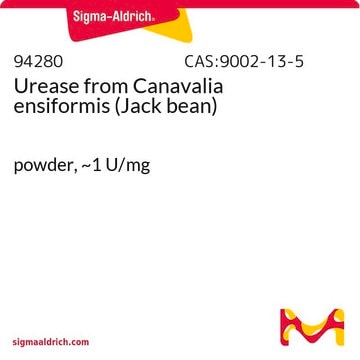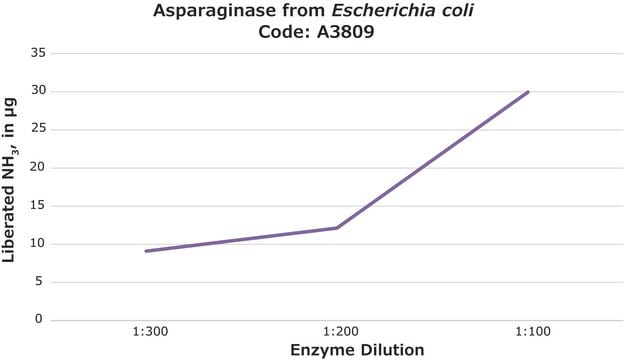A3233
L-Arginase from bovine liver
Protein ≥70 % by biuret, powder
Synonyme(s) :
L-Arginine amidinase, L-Arginine amidino-hydrolase
About This Item
Produits recommandés
Source biologique
bovine liver
Forme
powder
Activité spécifique
≥100 units/mg protein
Composition
Protein, ≥70% biuret
Numéro d'accès UniProt
Conditions d'expédition
dry ice
Température de stockage
−20°C
Informations sur le gène
cow ... ARG2(518752)
Vous recherchez des produits similaires ? Visite Guide de comparaison des produits
Description générale
Actions biochimiques/physiologiques
Définition de l'unité
Mention d'avertissement
Danger
Mentions de danger
Conseils de prudence
Classification des risques
Resp. Sens. 1
Code de la classe de stockage
11 - Combustible Solids
Classe de danger pour l'eau (WGK)
WGK 1
Point d'éclair (°F)
Not applicable
Point d'éclair (°C)
Not applicable
Équipement de protection individuelle
Eyeshields, Gloves, type N95 (US)
Certificats d'analyse (COA)
Recherchez un Certificats d'analyse (COA) en saisissant le numéro de lot du produit. Les numéros de lot figurent sur l'étiquette du produit après les mots "Lot" ou "Batch".
Déjà en possession de ce produit ?
Retrouvez la documentation relative aux produits que vous avez récemment achetés dans la Bibliothèque de documents.
Les clients ont également consulté
Notre équipe de scientifiques dispose d'une expérience dans tous les secteurs de la recherche, notamment en sciences de la vie, science des matériaux, synthèse chimique, chromatographie, analyse et dans de nombreux autres domaines..
Contacter notre Service technique













